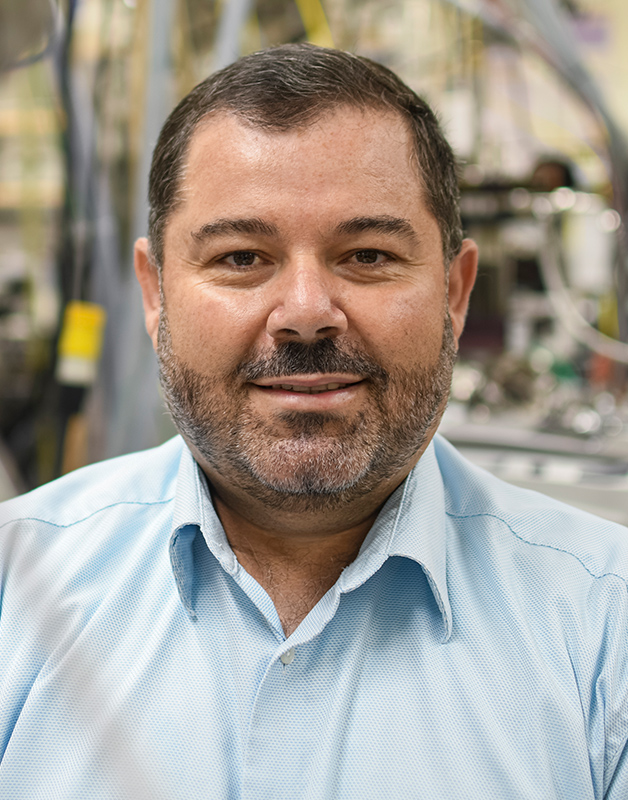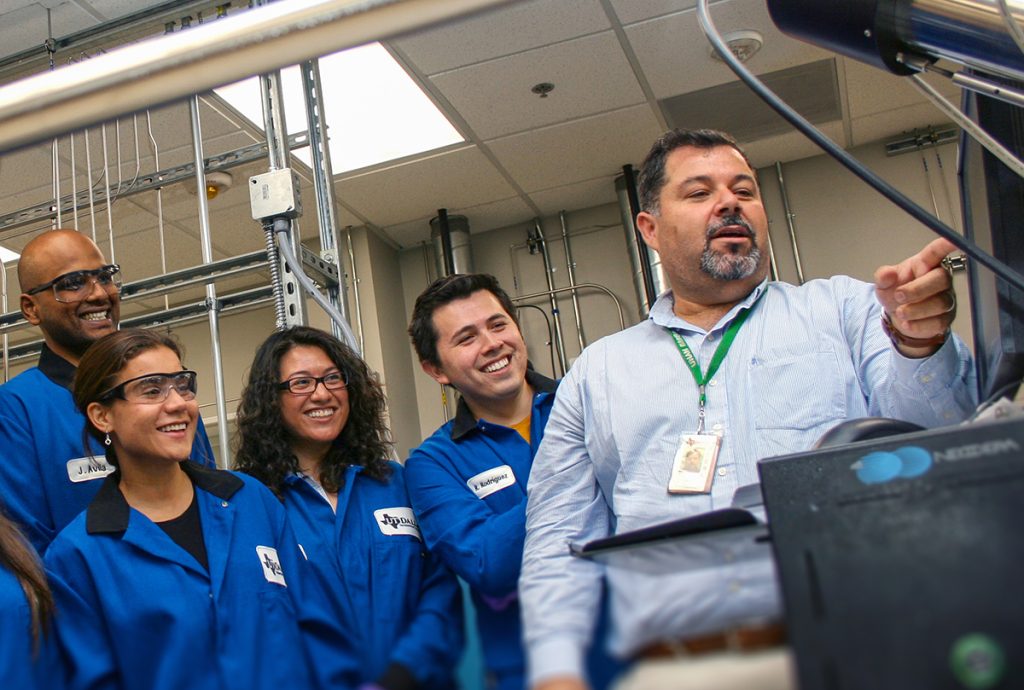
Applied Scientist Named Materials Science Leader

Dr. Manuel Quevedo, a scholar highly engaged in his field who has expertise in fundamental and applied science in the areas of sensors and large area electronics, is now head of the Department of Materials Science and Engineering (MSE) in the Erik Jonsson School of Engineering and Computer Science.
Quevedo is a professor of MSE with adjunct appointments in physics, chemistry and electrical and computer engineering at UT Dallas. While holding editorships with numerous peer-reviewed journals and serving as an advisor on numerous scientific panels, advisory groups and review boards, Quevedo has also helped significantly increase the diversity of students in the Jonsson School and at the University.
“I am impressed by Manuel’s sincere commitment and drive to serve all students – including concerted and successful efforts to recruit unrepresented minorities – and help them pursue a well-rounded and relevant educational experience,” said Dr. Stephanie G. Adams, dean of the Jonsson School and holder of the Lars Magnus Ericsson Chair. “In addition to scientist, leader, researcher, and editor, Manuel recently added ‘entrepreneur’ to his many roles that have earned the respect of his peers, students and outsiders.”
Quevedo recently launched WAND (Wide Area Neutron Detection), a startup company based on his group research.
“I am impressed by Manuel’s sincere commitment and drive to serve all students – including concerted and successful efforts to recruit unrepresented minorities – and help them pursue a well-rounded and relevant educational experience.”
Dr. Stephanie G. Adams
Jonsson School Dean and Lars Magnus Ericsson Chair
“WAND is a great way to train students about the scientific process and how it can be applied in real life,” he said. “The students involved in these types of activities have been exposed to and understand the language used outside their natural academic environment and have a better chance at accruing professional opportunities.”

Quevedo first experienced the applied side of engineering while working at Texas Instruments Inc. (TI) directly after earning his doctorate. At the time, the field was greatly interested in replacing silicon dioxide thin films used in a transistor with a thinner material. Quevedo worked with a multidisciplinary team that demonstrated that the thinner hafnium-based material could be used without compromising performance and current leakage. He is the co-author of several patents for this technology.
Career Highlights
Demonstrated multiple materials and devices for the microelectronics industry
Associate editor of Journal of Electronic Materials and of Sensors
Liaison Between UT Dallas and CONACYT Mexico
ConTex, Conacyt and Nanoholdings Board Member
Recently launched a radiation detection startup
Chaired more than 50 sessions/symposia at national and international conferences
Has supported about 70 graduate students, postdoctoral researchers and staff scientists
Holds 14 patents
Authored or co-authored more than 280 refereed publications
His work at TI included collaboration with faculty members in the then newly-formed MSE department at UT Dallas. They then recruited Quevedo in 2007, first as a research professor, but then he later joined the tenure-track system.
“Industry was great, but you are working on the company’s idea,” Quevedo said. “I enjoy the freedom of doing my own research on areas that I am passionate about.”
His first academic passion was flexible electronics. He transferred his silicon-based, electronic-devices-experience at TI to researching flexible electronics, with applications such as artificial tattoos used to monitor blood pressure or infection in open wounds.
His research interests later transitioned to large area electronics – applications such as electronic billboards or detecting radiation in large spaces such as airports and large sports venues. His current research focuses on materials interactions with radiation, gamma, neutron and X-ray for security and medical applications. The U.S. Department of Homeland Security, the Department of Defense, the National Science Foundation, industry, and other organizations fund his research. Recently, Quevedo’s group started exploring the use of alternate radiation sensors for cancer therapy.
His research and latest appointment as head of the Department of Materials Science and Engineering may not have been possible if not for Conacyt. Mexico’s national agency is responsible for promotion of science and technology and supported Quevedo with a fellowship to study abroad. Now, as an alumnus of the program, he facilitates study abroad student exchanges, fellowships and postdoctoral stays. When he joined UT Dallas, there were basically no participants at the University in the Conacyt program, but now there are about 15 students here, he said. He is also leading efforts to implement similar programs with organizations in Colombia, Chile and Panama.
Experience
Education
BS in chemistry, University of Sonora, Mexico; MS in materials science and engineering, Saltillo Institute of Technology, Mexico; PhD in materials science and engineering, University of North Texas
Research Areas
Sensors and large area electronics
Professional Positions
Member of technical staff, silicon technology development, Texas Instrument Inc. (TI); TI Assignee at SEMATECH (Semiconductor Manufacturing Technology) consortium; adjunct professor, University of Sonora; adjunct professor, physics, chemistry and electrical and computer engineering, professor of materials science and engineering, UT Dallas
Quevedo serves in roles with CIMAV and CIQA, the nanotechnology and chemistry arms of Conacyt; and with ConTex, a joint initiative with The University of Texas System. He has also encouraged numerous women and underrepresented minorities from the United States to pursue studies in science, technology, engineering or math at UT Dallas.
“One of the things I am most proud of is increasing the number of minorities who pursue degrees at UT Dallas,” he said. “There are brilliant minority students who sometimes only lack exposure to the idea of pursing an advanced degree, or to these specific programs that can help pay for it.”
Among his goals for the MSE department will be recruiting more faculty members and students as well as further increasing the national and international recognition of the department.
“We have our own clean room – staffed primarily by former professionals from the semiconductor industry – in a world-class laboratory building that houses all the disciplines necessary to be successful in innovation and collaborate with corporate giants such as Texas Instruments, Raytheon Co., Qorvo, Qualcomm and State Farm, who are all also our neighbors,” he said. “Most importantly, we have caring and productive faculty members and students.
“Leading this outstanding and diverse group at UT Dallas is a great honor and responsibility that I have been entrusted with by my peers, Dean Adams and University leadership – I look forward to building our program together.”